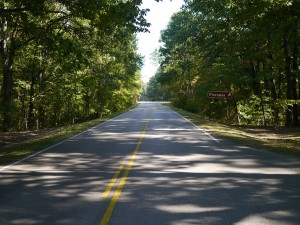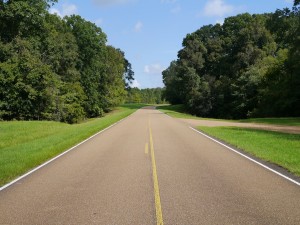Going In Peace
Part 4, the Natchez Trace
Thich Nhat Hanh teaches walking meditation. Early one morning in Hanoi he took a long line of us walking — slow and mindful, step by step, breath by breath — against the rush-hour torrent of 125 cc motor scooters, as government agents, no doubt, watched. I am wondering how walking meditation would go over in the small towns of the American South, if I tried it.
The region is mostly Protestant and about one-third Southern Baptist. Our drive through Louisiana, Mississippi and Tennessee on backroads left the impression that another third of the people attend non-denominational churches distinguished from each other by catchy themes. We noted signs proclaiming: Church of Divine Intervention, Abundant Life Church, Life Changing Ministries, Free Will Baptist Church, The People’s Church and Baptist Ministry churches of New Zion, Old Jerusalem and New Hope of the Brethren.
I imagined many of these were solitary creations of men like Robert Duvall’s preacher in “The Apostle.” Take, for example, Jehovah Java in Lake Providence, LA. It is an excellent espresso coffee shop in a Starbuckless world, and it is part of a non-denominational church. It was created by a minister and his wife who love the Bean and the Lord.
Thich Nhat Hanh’s Zen and all other Asian religions go unadvertised in the traditional towns. Walking meditation on a public thoroughfare might even draw the attention of the local sheriff. But an American counterpart to slow, mindful walking arose. Call it “driving meditation.” We invented this practice during three days in a narrow but wonderful 444-mile national park called The Natchez Trace Parkway.

Here is a clean two-lane road that flows gently through mountains and wetlands from Natchez, MS, to Nashville, TN. It is a corridor of nature that screens out towns and highways. It skirts the largest town, Jackson, MS, with no hint of the city except for occasional local runners who use a section of it. The parkway is a designated bicycle road, and the bikers an motorcycle riders are frequent. Commercial traffic is prohibited. The speed limit is 50.
The parkway follows an ancient trail used in the early 19th Century by postal contractors and by traders who floated down the Ohio and Mississippi Rivers and sold their goods in New Orleans or Natchez, disposed of their boats, then walked home. To me the drive induced an illusion, not of those days but of a pre-Interstate ideal, the simpler time of Route 66. Oncoming cars are infrequent, big trucks non-existent. There are no billboards. Intersecting roads pass over or under bridges. It is, in a word, peaceful.
And as you drive you can become mindful — actually see what you see, hear what you hear. The beauty of the galleries of trees in motion can erase daydreams as soon as they project themselves. This is meditation, at least the sort taught by the Chan Buddhists of China who sometimes described it with two characters: to sit, to forget.
“Behold, I create new heavens and a new earth. Former things shall not be remembered or come to mind.” (Isaiah 67:15) This was a prophecy of the end of Jerusalem, but it also is a promise of rebirth. And if it is internalized, taken in as poetry, it is a description of enlightenment. Sitting in forgetfulness.
I suppose that pastors don’t talk this way in the churches of the South, but I have had the privilege to listen at length (in Crestone) to a Southerner who speaks words of Awakening. He is Bart Marshal of Raleigh, North Carolina, who with his partner, Deborah Westmoreland, leads a “self-inquiry group” once a week in Raleigh. Non-duality is a basic premise of these discussions. It is the essential Buddhist premise of unity, leading to an understanding of creation as “dependent co-arising,” which is to say, “This is because that is.”
Marshal was a student of the late Richard Rose, another tough Southerner, who taught from a cabin on a backwoods farm in West Virginia. Rose admired the Hindu guru Ramana Maharshi and studied ancient Indian philosophy, including the Upanishads that teach, “You are God.” Rose advocated a process of Cartesian doubt in which you discard illusion after illusion until there is nothing left to doubt. Awakening can be sudden and unsought, like divine grace. Rose told Marshal, “There is no recipe for a lightning bolt.”
But this was all after 1968 when Marshal was ending a tour of combat duty in Vietnam and an explosion, in his words, “blew me into a clear and brilliant blackness that felt like ‘home.’” For 37 years he sought to comprehend this experience of “intimate emptiness” and then one day on a plane from a meeting in Europe it came to him. He wrote, “It is possible to know It directly, to realize It as your true self. . . ever present, the Source of all that is.”
Bart and Deborah speak of their awakening (their word) in a way that reminded me of born-again Christians. Her poetry speaks of “The Divine.” At the end of our last encounter I was so perplexed by the similarity to those who have found Jesus that I asked this question: “If I told you I did not believe in a higher power would you tell me to wake up?”
Bart declined to answer, so I put it another way, saying in so many words that I did not believe, as some simple atheists put it, that “God is your imaginary friend.” He said neither did he and therefore, he said, “Go in peace.”
Which is what I suppose I am doing here in the South.


Howard Nemerov, who was twice appointed Poet Laureate (1963-64, 1988-90) got life down succinctly. (I think in Texas thay call it Poet Lariat!)
A LIFE
Innocence?
In a sense.
In no sense!
WAS that it?
Was THAT it?
Was that IT?
That was it.
This was very provocative and thoughtful. Buddhism makes the most sense to me and I try to meditate as much as I can (not often enough)!